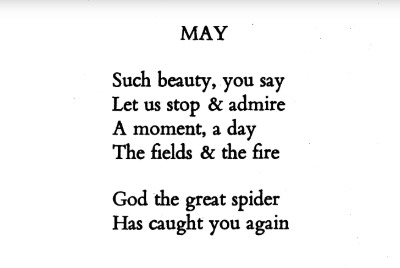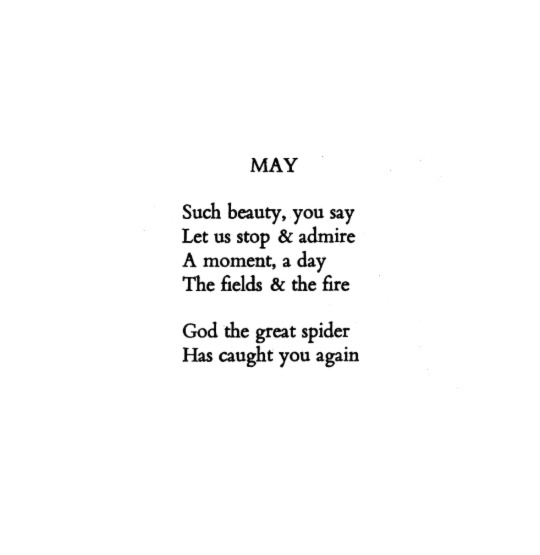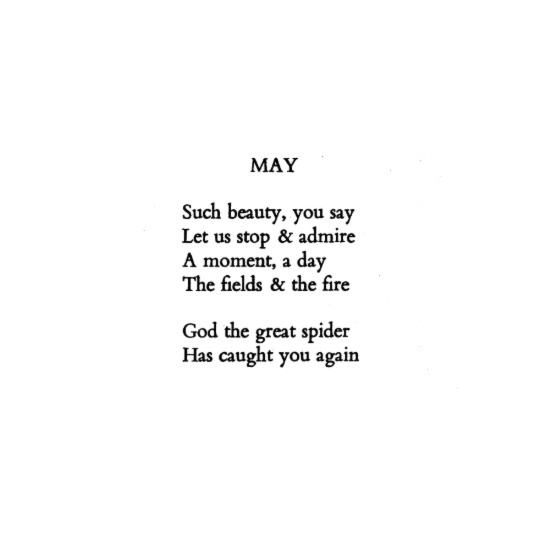#Tom Disch
Text
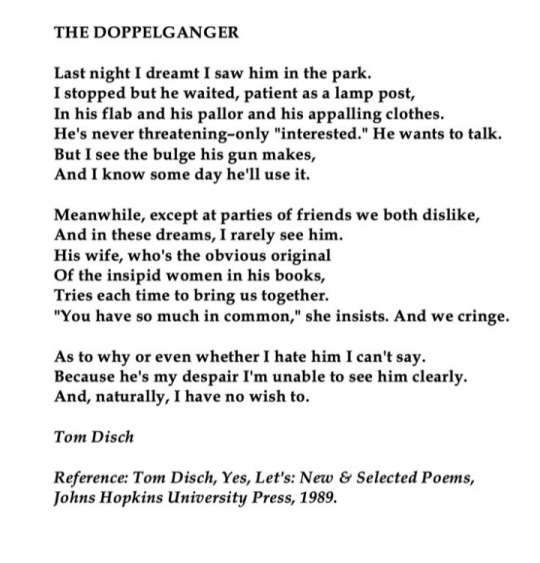
The Doppelganger, Tom Disch
2 notes
·
View notes
Text
Such beauty, you say
Let us stop & admire
A moment, a day
The fields & the fire
God the great spider
Has caught you again
-Tom Disch, “May”
#poem#poetry#spring#tom disch#may#admiration#wonder#God#trap#spiderweb#nature#beauty#world#attention
2 notes
·
View notes
Photo
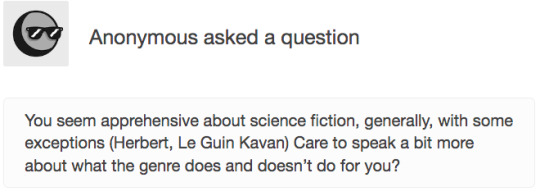
I think I mostly gave good reviews to everything in the genre I’ve written about, but you’re right that something in me hesitates.
I grew up with the genre. Influences still linger from my childhood: Heinlein sparked my interest in the literature of ideas, Bradbury turned me toward aesthetic prose, and Ellison modeled the writer as pugnacious public force. (Asimov and Clarke didn’t interest me then, just as Kim Stanley Robinson doesn’t interest me now. I’ve never cared about actual science, except maybe for the very idea of theoretical physics, which, sans the math, just returns us to speculative philosophy anyway.) I discovered Dick, Delany, Le Guin, Gibson, Ballard, and Butler later, mostly in college; I even interviewed China Miéville once—circa Iron Council—but didn’t keep up with his career after that. I love Tom Disch’s acerbic and more-than-apprehensive history of the genre, The Dreams Our Stuff Is Made Of, a real essay in the old liberalism equally dismissive of Heinlein’s Kiplingesque militarism and Le Guin’s Rousseauist pacifism. He would, had he lived, have made a good anti-woke pundit. I still haven’t read his fiction.
While science fiction and fantasy both get dumped in the “genre” bin with romance and detective novels, they are infinitely freer genres, since the conceit of imagined futures, imagined worlds, imagined technologies, or imagined aliens makes no plot demands in the way that romance and detective novels require certain story structures, however subverted. In that way, science fiction isn’t a genre at all but a mode (related to satire and utopia) requiring that other genres be grafted on to create a novel proper, whether noir (Neuromancer), historical romance (Dune), boys’ adventure (Starship Troopers), slave narrative (Kindred), imperial romance (The Left Hand of Darkness), etc. You can do (almost) anything in science fiction.
Yet “related to satire and utopia” is the catch: the source of my hesitation. There is something irreducibly ideological in the genre, “ideological” not in the Marxist sense of “hidden structuring assumptions that uphold vested interests” but in the liberal sense of “willful and reductive systematic reasoning.” Why would anyone imagine a future, a world, a technology, an alien, if not to make a point? Science fiction by its nature has “a palpable design upon us.” Some writers can use this to advantage, as in Solaris, a genuinely searching essay, but the risk of didacticism is sky high.
You can’t write a novel in the Jamesian sense—a shaped record of inner sensibility encountering outer experience in the present—within science fiction, because it asks for the totality of your views on nature and society up front without letting them emerge slowly from the artistic process itself and therefore surprise you as much as the reader. I have tried to write science fiction as an adult, and every time, I bog down in exposition, losing myself in the composition of a political treatise before I can meet a character or see a sight. My own lack of capacity should be blamed first, but not solely. So if I ever seem to think science fiction per se falls short of art, that would be the reason.
18 notes
·
View notes
Text
Fiction
Carrie stephen king x
the silence of the lambs Thomas harris x
The big nowhere James ellroy x
Speedboat Renata adler
Giovanni's room James Baldwin x
Nightwood djuana barnes x
Troutfishing in America Richard brautigan x
Play as it lays joan didion x
Desperate characters Paula fox
The golden notebook Doris lessing
The moviegoer walker Percy
The man who loved children Christina stead
Time with children elizabeth tallent
Getting into death Thomas m. Disch
Where you'll find me and other stories anne bettie
God lives in st Petersburg Tom bissell
The zebra storyteller Spencer holt
The art of struggle Michel houellebecq
The boat nam le
Pigeon feathers and other stories john Updike
Everything ravaged, Everything burned wells tower
What narcism means to me Tony hoagland
Pity the bathtub it's embrace of human form mattea Harvey
Foucalt's pendulum Umberto eco
The canterville ghost Oscar wilde x
Los sorias Alberto laiseca
Pandemonium Darryl gregory
Hopscotch Julio cortazar
Igur nebli miquel de palol I muntanyola
Journey to the end of the night louis-ferdinand Celine
Point omega Don dellilo
Black Sunday Thomas harris
El jardi dels set crepuscles Miguel de palol I muntanyola
The street of crocodiles Bruno Schultz
Tabu Timo k. Mukka
Don't forget to breathe (migrations, volume I) ashim Shankar
El troiacord Miguel de Pollo I muntanyola
The egg head republic Arno schmidt
Rock star Jackie Collins
The lost scrapbook evan dara
Geek love Katherine dunn
Parley after life diy guide to death and other taxes Bobby Miller
God's mountain erri de Luca
Precarious: stories of love, sex and misunderstanding al riske
Where are the children mary Higgins Clark
Gryphon: new and selected story Charles baxter
Venus drive Sam lipsyte
The girl in the flammable skirt aimme bender
The chrysanthemums and other stories john Steinbeck
A clean well lighted place Ernest Hemingway
To build a fire and other stories jack london
Why I live at the p.o and other stories Eudora Welty
Appointment in sammara john O'Hara
Man in the dark Paul auster
The rocking horse winner d.h Lawrence x
House of sleeping beauties and other stories yasunari kawabata
Time's arrow martin amis
Blubber island Guillermo galvan
Darconville's cat Alexander theroux
Canti del caos Antonio moresco
Sam Dunn is dead: futurist novel Bruno corra
Lonesome dove Larry mcmurtry
0 notes
Text
Poetic License
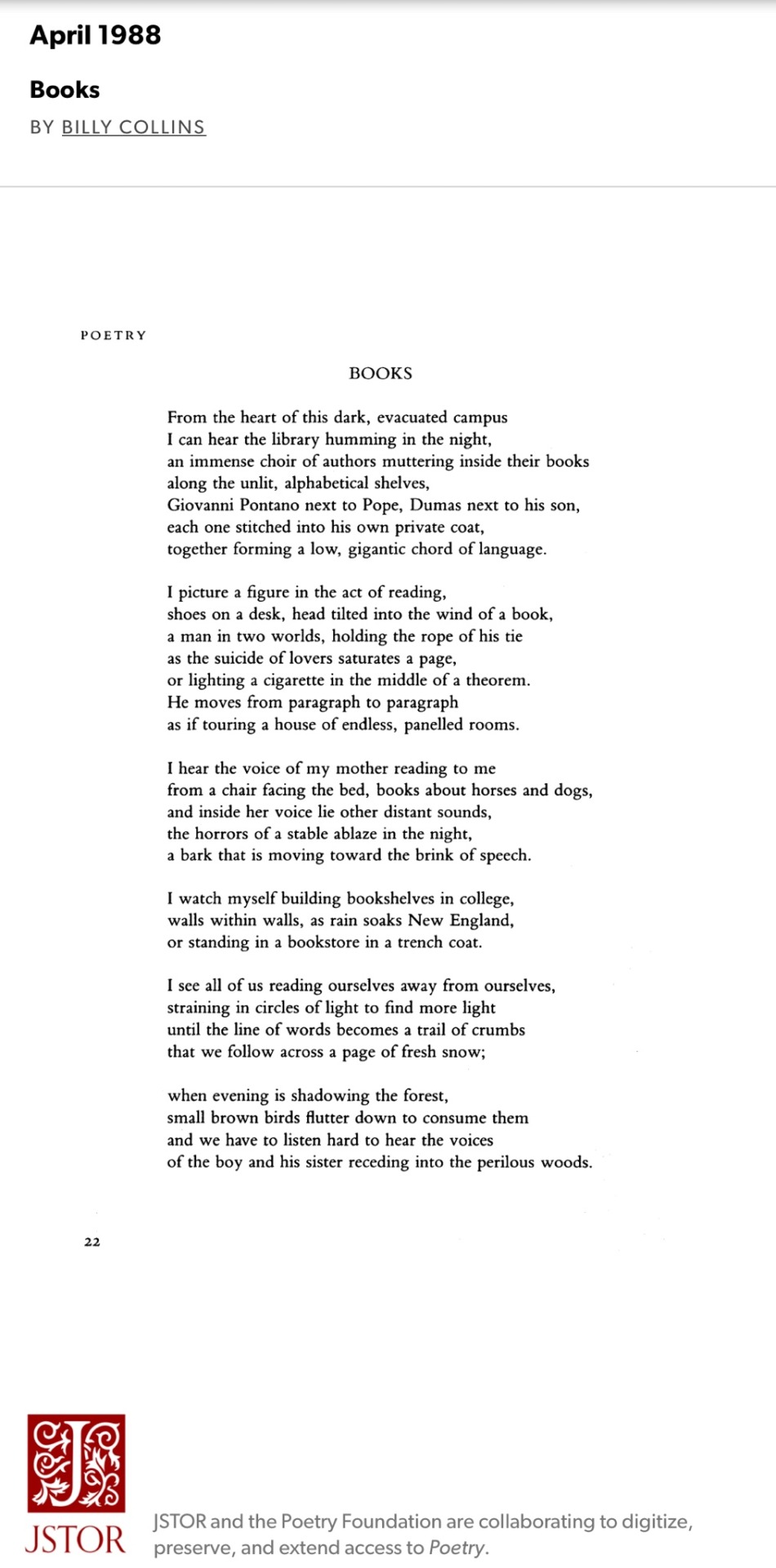
Link: https://www.poetryfoundation.org/poetrymagazine/browse?contentId=37090
After looking for a poem on the Poetry Foundation website, the one I chose is "Books" by Billy Collins. The narrator describes an empty College campus by using imagery. For example, the narrator starts by saying, "From the heart of this dark, evacuated campus, I can hear the library humming in the night..." It continues by mentioning the books on the shelves and the " immense chair of authors muttering inside their books."
The author lists classic literature authors such as Giovanni Pontano and others. Indicating the different genres that exist. What really caught my attention is the description of a "Figure so immersed in a book, "a man in two worlds, meaning that reading takes him to his book's world. He is so focused that "he moves from paragraph to paragraph as If touring a house of endless, paneled rooms." It is like time stops or does not exist when the man reads. This is relatable because when I read the same thing happens to me, it is like time does not exist and takes me to a different world.
The first two stanzas of this poem have a curious and mysterious tone, and then, in the following paragraphs, it changes to a nostalgic one. The man takes the narrator back to his childhood or memories of the narrator's mother reading to them when they were a kid. It makes me understand that reading has always been an important part of the narrator's life and continues to be. Afterward, It goes back to the present, where the narrator is "building bookshelves in college" and describes how we usually "read ourselves away from ourselves." Collins does a good job putting into words what most readers feel when reading something they love and enjoy or simply when trying to take a break from the real world.
Last, From my point of view, the themes of this poem are escapism and nostalgia.
0 notes
Text
Poetic License
After reviewing and selecting the right poem that conveyed my feelings about the aspect of life itself or a generalization on how life itself can feel, the poem that I selected for my synopsis is one by Aram Saroyan titled "Life is a dream." The overall theme of this piece is that despite life being prevalent, it could also be imaginative. For example, in the second stanza, a metaphoric device is utilized to express the author's imagination. The author conveys this message powerfully as this represents his mind as it wanders into the distance of their imaginative thoughts. Another example of a metaphoric device utilized is the sixth stanza, where the author describes a child's emotion to the likeness of burning wood. A child's emotions are strong, and they express themselves in totality like a raging fire holding no feeling back, whether happiness or sadness. The diction applied in this piece with the author's use of comparisons of things and relating them to certain aspects of reality. Figuratively connecting reality with imagery, additionally and ironically, the last stanza kills the youthful interpretation the piece conveyed. The author utilizes two opposite words, which ironically are closely connected. Ultimately, despite our ability to help us cope with such a dull atmosphere, reality as we see it is inevitable and inescapable. I felt that towards the end of the piece, the author became more raw and honest with his thoughts and explained his imagination and perspective on the aspect of life that revealed itself.
0 notes
Text
The Crumbling Infrastructure by Tom Disch
A limb snaps, the hive is smashed, and the survivors
Buzz off to colonize another neck of the woods.
No nest is sacrosanct. Abandoned churches may serve
A while as discotheques. Steel towns may hope
To be retooled to meet the needs of foreign banks
Anxious to reinvest evaporating capital
Beyond the reach of ruin. But generally decay’s
The aftermath of desuetude. Rome,
What’s left of it, falls to the Hun, and all
Its noble plumbing is undone. The fountains
Of Versailles run dry, and the Bourbons are remembered
As a lower-class alternative to Scotch.
In all these matters money rules, but not as the sun,
Benign, inscrutable, and far away, but as a river would,
Collating the waters of a hundred townships,
Tolerant of dams, a source of wonder and a force
Even the Federal Reserve cannot coerce.
Basements flood, canoeists (i.e., small investors)
Drown, and nothing can be done about the mosquitoes,
But on the whole one does well to dwell in the valley.
Money, like water, yields an interest hard to deny.
Every dawn brings new quotations in the pages
Of the Times; every sunset gilds the thought of death
As though it were the mummy of a king.
Then is every man an Emerson,
Aghast at the everlasting, wild with surmise,
His daily paper dewy with the news
Of history’s long, slow slouch toward
That Götterdämmerung dearest to pulp
Illustrators: Liberty’s torch thrust up,
Excalibur-like, from the sands of a new Sahara
Or the waves of a new flood, her bronze flame
All that remains of Babylon. A pretty sight--
But meanwhile Liberty’s toes are dry, bridges
And tunnels still traversible, and someone had better
Be paid to patch these goddamn potholes, that’s all
I’m trying to say, because if they’re not,
Someone’s going to break and axle, and it could be one of us.
2 notes
·
View notes
Text
I knew him. I loved him. I sat at his feet.
— Tom Disch
6 notes
·
View notes
Text
"Villanelle for Charles Olson" -- Tom Disch
“Villanelle for Charles Olson” — Tom Disch

View On WordPress
3 notes
·
View notes
Photo
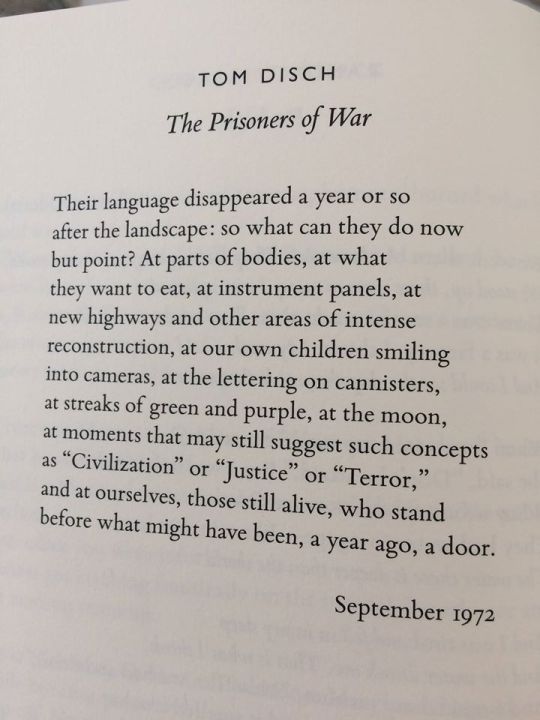
Tom Disch (1972), “The Prisoners of War”.
“Their language disappeared a year or so / after a landscape: so what can they do now / but point?”
1 note
·
View note
Text
Odd Poems: Thomas M. Disch, 'A Child's Garden of Grammar'
Odd Poems: Thomas M. Disch, ‘A Child’s Garden of Grammar’
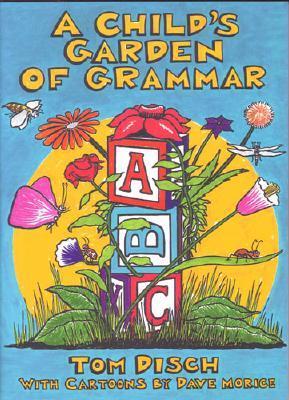
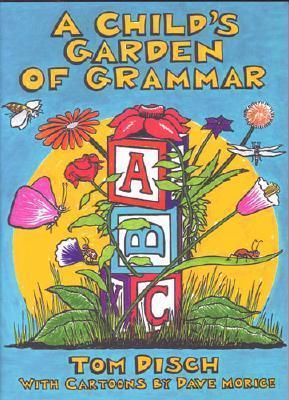
Thomas M. Disch (1940-2008) was a New Wave Science Fiction author, poet, theater critic, computer game designer, and much else. Not surprising, then, that his Grammar is a strange book. Sadly, it’s not really informative for either the grammar-beginner (it’s too obscure) or the grammar-expert (there’s nothing new). It has odd poems, some nice and simple like ‘Either/Or’:
Either and Or came to…
View On WordPress
0 notes
Text
Unauthorized water

It's not clear when General Electric started boobytraping appliances with DRM. I first encountered it in January when Shane Morris tweeted about his fridge refusing to accept the $19 generic filter he replaced the GE $55 filter with.
https://twitter.com/IamShaneMorris/status/1220367934947758080
The fridges use an RFID detector to distinguish original GE filters from generic replacements, and engage in lots of anti-owner trickery, like memorizing the IDs of previously used filters and refusing to accept them.
https://bbs.boingboing.net/t/unauthorized-charcoal-ge-fridges-wont-dispense-ice-or-water-unless-your-filter-authenticates-as-an-official-55-component/159552/41
Morris isn't the only one ourtaged that his fridge is plotting against him. One (anonymous) owner was so offended that they created a site dedicated to warning off potential buyers and explaining to other suckers how to bypass GE's lockouts.
https://gefiltergate.com/
There's a good reason for the anonymity. Under Sec 1201 of the Digital Millennium Copyright Act, showing how to bypass an "access control" to a copyrighted work (eg RFID-detecting code in the fridge) is a potential felony, carrying a 5-year prison sentence and a $500k fine.
This is quite the moral hazard. Manufacturers have learned that if they design their products so that any use that hurts their shareholders (like buying third party parts) requires bypassing DRM, it becomes a felony to use your own property to your own advantage.
Which is why we've seen DRM creep into all manner of devices, from insulin pumps to tractors to car engines to Iphone screens. "Felony contempt of business model" is the statute that every monopolist has dreamt of, and with DMCA 1201, they have it in their grasp.
Back in 2011, I wrote a short story about this for MIT Tech Review's first sf anthology, called "The Brave Little Toaster" (in tribute to Tom Disch).
https://craphound.com/news/2011/09/28/the-brave-little-toaster-from-trsf/
The issue only got worse, and so last year I published "Unauthorized Bread" as part of my collection "Radicalized" (it's being turned into a TV show by Topic):
https://arstechnica.com/gaming/2020/01/unauthorized-bread-a-near-future-tale-of-refugees-and-sinister-iot-appliances/
The metastasis of DRM into every product category shows that when business apologists talk about the sanctity of property, they mean the sanctity of CORPORATE property.
If the manufacturer gets to override your decisions about the things you buy - and felonize any attempt to wrest control back - they property ceases to exist. We become tenants of our devices, not owners.
It's digital feudalism, in which an elite owns all the property and we get to use it in ways they proscribe. The difference is that today, our aristocracy isn't even human.
It's the immortal, remorseless colony organism called the Limited Liability Corporation, to which we are mere inconvenient gut flora.
28K notes
·
View notes
Text
A Lafferty Christmas Poem
Below you will find a previously unpublished—indeed, previously unsuspected—Lafferty poem. I found it while looking through files at the Virginia Kidd Agency, specifically folders on Kidd’s speculative poetry zine, Kinesis.
While it only lasted for three issues, Kinesis published or republished work from Ursula K. Le Guin, Tom Disch, Damon Knight, Joanna Russ, Gene Wolfe, Carol Emshwiller, and James Blish among others...as well as one Raphael Aloysius Lafferty. I knew that much going in, and was able to confirm his contributions (which have never been reprinted elsewhere) to two of the zine’s issues.
What I didn’t know is that Kidd had gathered enough material for at least two more issues of Kinesis, but was unable to bring them out after her mimeograph machine broke down and other concerns crowded out her zine-making time. She held out hope for a while (and that’s a story I’ll tell another time) but in this context the upshot is a fine poem from Lafferty going unread for 45 years or so.
I don’t know whether he meant the poem as a submission, or if he just wrote it to her as occasional verse, and she seized upon it. There’s no carbon in Lafferty’s archive relating to the poem or indicating its existence in any way; if there’s anything in the Kidd Archives, they’ll have to surface as the materials gradually make their way to the University of Oregon, to join the collections of Le Guin, Russ, et al.
Anyway, I’ll leave further analysis of it to others, for now. Hope you enjoy, and that your own Christmas, season, and holidays are merry and bright.
Image follows:
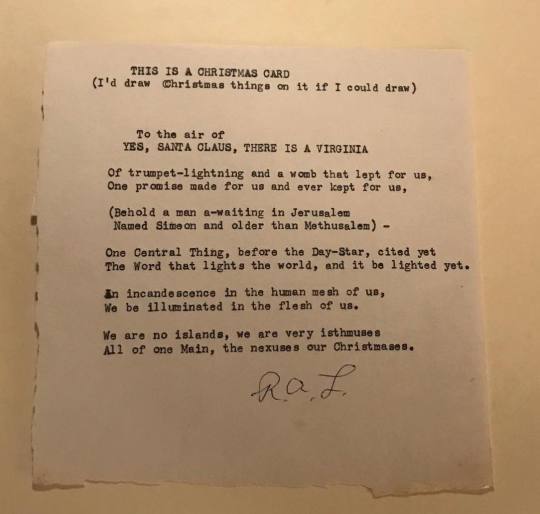
Transcribed text:
THIS IS A CHRISTMAS CARD
(I’d draw Christmas things on it if I could draw)
To the air of
YES, SANTA CLAUS, THERE IS A VIRGINIA
Of trumpet-lightning and a womb that lept for us
One promise made for us and ever kept for us
(Behold a man a-waiting in Jerusalem
Named Simeon and older than Methusalem) —
One Central Thing, before the Day-Star, cited yet
The Word that lights the world, and it be lighted yet.
An incandescence in the human mesh of us,
We be illuminated in the flesh of us.
We are no islands, we are very isthmuses
All of one Main, the nexuses our Christmases.
R.A.L.
(My thanks to the Lafferty Estate folks at Locus for granting permission for me to reproduce this poem, and to the good people at the Virginia Kidd Agency for once again letting me invade their workspace and root through their archives.)
549 notes
·
View notes
